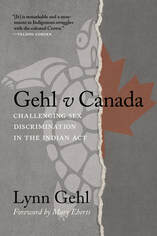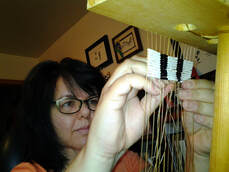 Gehl v Canada (Fall 2021) Gehl v Canada (Fall 2021) My Algonquin Anishinaabe identity flows through my father, his mother, and her parents (my great-grandparents). Through learning who I am I can also link myself to the people who lived at the Lake of Two Mountains and thus to pre-contact relatives. Me saying that I can link to the historic community of the Lake of Two Mountains and pre-contact relatives does not mean my Algonquin identity, that I claim, merely comes from an ancestor that lived in the 1700s. Not at all. I am clear about my identity coming from my father. Please do not misunderstand what I am saying or cherry pick back to pre-contact times. What is more, while through Gehl v Canada today I am a registered status Indian I really do not have a community where I feel I am embraced. For one thing, I cannot go and live at Pikwakanagan First Nation as there is not enough space and, even if there was, I am not sure I would be welcomed by the people. What I have become, through Gehl v Canada, is a name on a membership list versus existing within a community. It is clear to me that my father’s, grandmother’s, and great-grandparents’ community has been greatly harmed by colonization and genocide. This is why I do the work that I do. My allegiance is with my kin relations. I, though, am “fortunate” in the sense that the land where some of my extended kin relations now exist was not relocated or flooded, and that my great-grandmother with her mother (my great-great-grandmother) opted to move to a reserve. But the reality is that not all Algonquins in Ontario and Quebec wanted to go to reserve communities, and mixed bloods were not welcomed, or for that matter were pushed out of the community when they “married-out”. This was part of the genocide process. My point here is that just as DNA and a blood line have limitations, community essentialism also has many limitations. Identity is more than about being welcomed to a community or having a community. This is especially so when we appreciate that through colonization many communities and community relationships have been destroyed. What I have are kin relations with a particular community. I always had these kin relations as my father made sure he passed on to me these kinship stories, best known in the language as “gi-nwendaagininaanig dbaajimowinan”. Now that I have status registration as per the Indian Act things are not that much different. While the kin relations are there I would not say I belong to a community. Genocide happened; and genocide continues to happen such as through the land claims process. Certainly the struggle Indigenous people are having regarding identity is difficult and heart breaking. Well, it is heart breaking for me. What is making it worse is all the settler academics and people jumping on board with who, and what is, in vogue. In doing this, settlers interfere with the Indigenous process of figuring it out; well, hopefully working it out. All this is not to say that I am not appreciative of the needed critical analysis of settlers claiming to be metis for the sole purpose of gaining Indigenous rights, and also appreciative of the needed critical analysis of settlers claiming to be Algonquin for the purpose of gaining rights through the land claims process – a land claims process that will only serve to extinguish Algonquin land and resource rights. It is important for us to remember that historically, prior to contact, Indigenous nations adopted, assimilated, kidnapped, and nurtured new members into our communities. Through rituals such as initiations, dancing, ceremony, feasting, and loving kindness we socialized people into being new citizens of our Indigenous nations. While belonging was a blood process, we also valued the medicine of genetic diversity, and we also understood that belonging was very much a social process that was more about loyalty to the nation. Through genocidal laws, policies, and practices the nation state of Canada took all these inclusive processes of establishing our citizenries away from us; yet at the same time Canada appropriated the cultural process of socializing new citizens into their nation. What I mean by this is that by usurping Indigenous land and resources Canada is able to embrace refugees and immigrants as new citizens of its nation. In this process Canada relies on Indigenous land and resources to socialize its new citizens into being good, obliging, loving, and loyal Canadians. Minister Maryam Monsef is one such celebrated Canadian citizen that the current prime minister likes to hold up as a success story. The socio-cultural processes and rituals that Canada relies on consist of such things as manipulating their minds by controlling the school curriculum and filling their hearts through the daily ritual of singing O Canada. Other mechanisms used to socialize new citizens of the Canadian nation consist of skewing media stories, offering national awards to accommodating people, creating provincial and national parks, filling national museums with state propaganda, and, to ensure the completion of hegemony, the ongoing creation and manipulation of national symbols and icons such as the Canadian flag and creating national monuments of acceptable heroes. As Canada does this, creating new citizens of the state, Indigenous people fight about DNA and blood essentialism, fight about community belonging essentialism, and for that matter fight about cultural continuity essentialism, all the while forgetting about their own practices of inclusion. I know that DNA and blood, community belonging, and for that matter that even cultural continuity all have limitations. What is more important is kinship connections, loyalty, and allegiance. Lastly, sadly Canada has pushed Indigenous people to the point where we have forgotten that in its anthropomorphic form, and after the human spirit has moved through the heart, morality, inclusive of loving kindness, takes that same heart pathway.  © Lynn Gehl, Ph.D. is an Algonquin Anishinaabe-kwe from the Ottawa River Valley. Her most recent book Gehl v Canada is now available for pre-orders: https://uofrpress.ca/Books/G/Gehl-v-Canada
5 Comments
Sharon Moon
5/20/2021 01:23:22 pm
Thank you for this reflection on identity Lynn. It really helps me understand things a lot better. I appreciate your clarity.
Reply
Roseann Marble
5/20/2021 06:55:58 pm
Very Interesting. You have a way with words.
Reply
Jan
5/21/2021 04:53:33 am
Thank you for this clear and concise read. Best wishes as you continue your journey towards the definition of and promoting the understanding of these issues for everyone.
Reply
John steckley
5/22/2021 11:46:09 am
You have said some important things here that people, Indigenous and settler, need to read. Well done.
Reply
Gianne Broughton
5/23/2021 06:05:37 pm
Thank you for this blog and for your diligent persistant legal work. Having read this blog, I feel like I have been offered an invitation to open my mind to a possibility that leaves many familiar crutches behind.
Reply
Your comment will be posted after it is approved.
Leave a Reply. |
|
To subscribe to Lynn's Blog: click here
To subscribe to Lynn's Newsletter: click here To follow Lynn on her Public Facebook Page: click here To subscribe to Lynn's YouTube channel: click here To book Lynn as a speaker: click here To contact Lynn/License her work: click here Copyright Dr. Lynn Gehl, 2024 All Rights Reserved
|
 RSS Feed
RSS Feed
